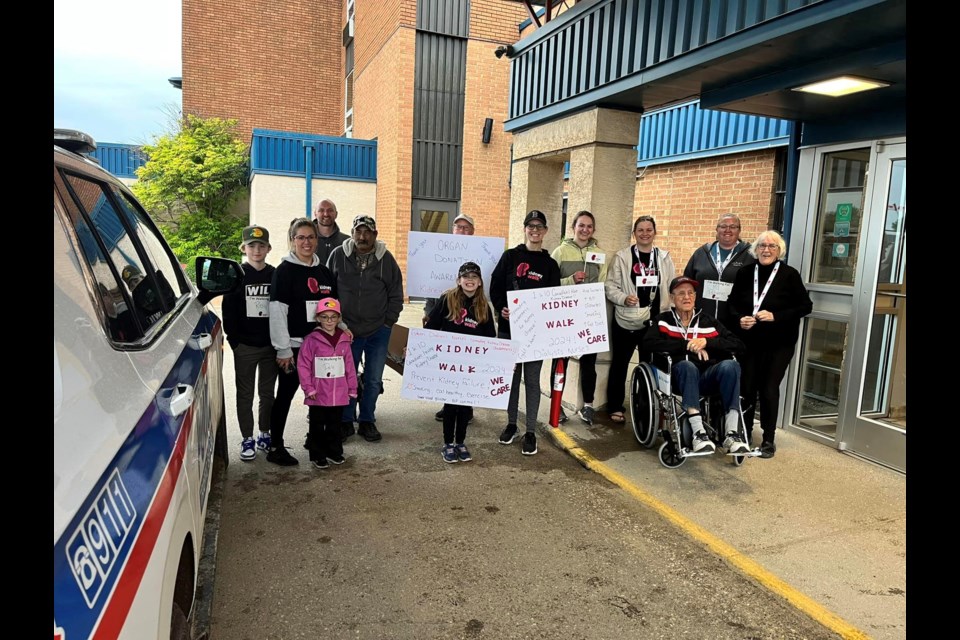ESTEVAN — The second annual Kidney Walk in Estevan took place on June 17, with participants gathering at the Days Inn before walking along 13th Avenue to the Orpheum Theatre.
Organized by the St. Joseph's Hospital Renal Unit nurses and promoted by the Kidney Foundation of Canada, the event aimed to raise awareness and funds for kidney disease research and support for patients.
This year's walk saw participation from four nurses, patients and family members. Among the six fundraising team members – Desiree Doyle, Brenda Kittelson, Gail Torgunrud, Jennifer Juneau, Kelsey Barlow and Wendy Curtis – 40 donations were collected, totalling $2,294.68 as of Tuesday afternoon, which significantly exceeded their $1,000 goal and last year's total of $1,700.
Juneau, one of the nurses who partook in organizing the event, said they had a good turnout despite the chilly weather and positive outcomes.
The Kidney Walk is an annual initiative by the Kidney Foundation of Canada, held in various communities nationwide. The event not only raises funds but also increases awareness about kidney disease and the foundation's efforts to support patients.
"The Kidney Foundation of Canada does a lot for people with kidney disease," Juneau explained. "One in 10 Canadians has kidney disease, and our rates are increasing every year. Last year, the foundation put more than $2 million into research."
Estevan's renal unit at St. Joseph's Hospital is staffed by highly experienced nurses with up to 17 years of dialysis experience, which is quite unique, Juneau noted.
"This level of expertise is invaluable in providing high-quality care for our patients," she said.
The funds raised locally and across Canada help the Kidney Foundation continue its critical work, which includes financial assistance for patients, educational resources, support groups and organ donation awareness.
"The Living Donor Program is particularly important. It raises awareness about becoming a living donor, which can significantly reduce the transplant waitlist and improve patients' quality of life," Juneau said, noting there is a Living Organ Donor Expense Reimbursement Program, which is a provincial program that reimburses some out-of-pocket expenses and makes it possible to be a living donor, even when living far away from the recipient.
All of the resources provided by the foundation are available and utilized by patients in the southeast, as well as in other parts of the province and the country.
Juneau also underlined the broader impact of the foundation's work.
"They provide financial assistance, support groups and even kids' camps. Kidney disease affects people of all ages, and the foundation's programs are vital for improving lives."
She also quoted the information from the foundation to help raise awareness about kidney disease risk factors.
"There's a number of risk factors for kidney disease. Some things that you can control such as smoking, and others that you cannot. People with diabetes, high blood pressure, or who have a family history of kidney disease are at increased risk, as well as children born with kidneys that did not develop properly," Juneau said.
"People of Aboriginal, Asian, 小蓝视频 Asian, Pacific Island, African/Caribbean and Hispanic descent are also at higher risk. But you may develop kidney disease even if you do not fall into one of these categories.
"Be careful about taking non-prescription medications, particularly painkillers. It is wise to discuss all over-the-counter medications with your doctor or pharmacist. Certain other medications, toxins, pesticides and illegal drugs, such as heroin and cocaine, can also cause kidney damage.
"Recent estimates suggest that as many as two million Canadians have chronic kidney disease, or are at risk, and most are unaware of it. So, if you're over the age of 50, or fall into any of these categories, ask your doctor for blood tests to know your kidney function level."
For more information about the Kidney Foundation of Canada and how to support their initiatives, visit their website at kidney.ca.
Donations to support local renal unit efforts can still be made at the .





